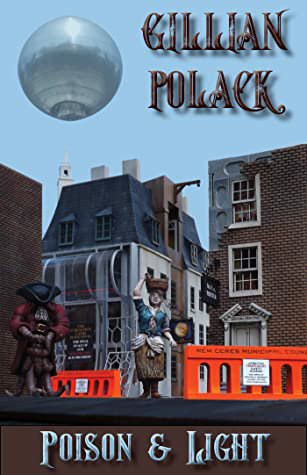“To immerse yourself in Utopian thinking is to refuse to engage with the real, suffering world” – Gwyneth Jones (1)
Nobody reading Gillian Polack’s Poison and Light would seriously consider the colony of New Ceres a utopia, but for many of the inhabitants of New Ceres capital Prosperine, it is an idealised world.

New Ceres is a restricted colony, where society operates in the manner of the Age of Enlightenment. No technology is allowed that was unknown at the end of Earth’s 18th century. The fashion is to meet and discuss anything of import in coffee houses, and salons, or through printed pamphlets (approved by the Lady Governor of course.) It is a world of honour, prestige, and reputation above all. It is the ideal, for the elite classes.
Jones continues “Isn’t the society where ‘everybody’ is good, simply a society described from the point of view of those who stand to benefit most?” New Ceres is that society at first glance. That ideal, Enlightenment, gossipy pleasure life is what we seem to see as Livia’s aim.
Livia, hostess, matchmaker, manipulator and schemer, carefully plans her every move to her advantage. Flirtations are encouraged, or diverted, over lingering, luxurious dinners. Livia has a taste for everything, uses it as a gastronomic memory palace. But slight her, and it will be a cold dish you are served.
In Livia’s New Ceres, being seen in the right places with the right people is the measure of quality. The salon and the coffee house, the fineries and the fripperies have an Austen-tatious air.
Into this Society comes an off-worlder, a famous artist and refugee from the destroyed earth, Grania. When Livia’s husband Alphonse tries to exploit Grania, the wealthy Dal rescues her and marries her. From this point she is unwittingly in opposition to Livia.
It probably doesn’t spoil anything to say that Livia, known for discretely removing rivals, is Poison whilst Grania the artist seeking the right subjects, is Light. Their clashes are occasionally direct, but often subtle and via proxies. Livia’s ambition is loftier than Grania knows, but Grania finds support in unlikely places. In a society of open gossip, the secret society is powerful.
The Jones quotes above were actually about Ursula K Le Guin’s famous story ‘The Ones Who Walk Away From Omelas’ which shines light on the dark underbelly of an apparent utopia. On Polack’s New Ceres food is potentially poisonous, sometimes fatally, unless treated using the only permitted technology. Who controls the tech controls New Ceres, and a form of servitude is the sole option for the lower classes. Grania shines the light on the poison.

Poison and Light is a Science Fiction novel in which, mostly, the Science Fiction is offstage. We know there’s a spaceport, that there was a war between aliens and the Inner planets in which Earthers were put in camps and murdered. We don’t see that.
This is Gillian Polack’s great trick here, she tells rather than shows so much of the time, yet makes it work. We are told of broadsheets circulating, some official a few samizdat. The approved printer known only as Mr F. plays his part here. Brief chapters simply tell the content of an article. A review of a coffee shop, a tourist guide to the Code Duello, a reprint of a genuine Enlightenment witch trial which creates a parallel in this New Enlightenment.
In this, although the surface is Enlightenment and Austen, it is told through the stylistic filter of a satirical Thomas Love Peacock. It is a perception of Enlightenment that New Ceres has adopted, rather than a true image, something that is shown by the relative influences of Social Standing versus actual Wealth. Polack even tells us this when a character is accused of having read too much Georgette Heyer. In a Jewish settlement outside of Prosperine Grania is told “It’s playacting. We pretend to haskalah and historical correctness.”
She tells us what happened, is happening, and will happen within a page. And via the interjections of tourist reporter Fred Xian, who we appear not to see onstage directly*, she provides commentary on those happenings.
Livia’s political manoeuvres create the drama, Grania’s political awareness creates a different perspective. For a novel about politicking though, there is a less overt political thread that runs deeper. Grania’s story is that of the refugee, the migrant, seeking to fit in a strange culture, to make her stand in a new society. Her husband, Dal, notes “I forget that when we adopt something from Mother Earth it doesn’t mean that people from Earth know it.” It’s as close as he comes to seeing his privilege.
Dal is a sympathetic character, despite his failure to see what Grania faces, and there are minor characters who standout too. Fabian the swordsman and frequenter of the Molly House, and Lizzie the Floozy, as Livia calls her, are possibly a charming couple, and great in a crisis. Their story could be told further.
Poison and Light languished through publishing failings for a decade prior to publication last year. Gillian Polack has published several novels in that time, but there are recognisable traits in this that her readership may note. The set piece dinner, the use of food, or more often coffee. The discursive telling whilst events happen in the background. And the strong, determined and interesting female leads.
Poison and Light is a gripping, funny Science Fiction novel wearing Jane Austen dress filtered through Thomas Love Peacock. It may not be for everyone, but I loved it.
1. Deconstructing the Starships, p201
* I have my suspicions about Fred, but no spoilers. I’m only guessing.
